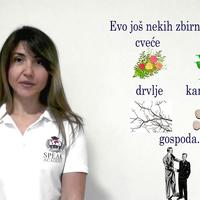Lesson 7.1 Serbian Language - Collection numbers
|||Collection|collection numbers
Lektion 7.1 Serbische Sprache – Sammlungsnummern
Lesson 7.1 Serbian Language - Collection numbers
Lección 7.1 Idioma serbio - Números de colección
Lezione 7.1 Lingua serba - Numeri di raccolta
Урок 7.1 Сербский язык - Коллекционные номера
Ders 7.1 Sırp Dili - Koleksiyon numaraları
Zbirni brojevi
Aggregate|numbers
Cumulative numbers
Deda Mika ima petoro unučadi
Grandpa|Grandpa Mika||five|grandchildren
Grandpa Mika has five grandchildren
dva dečaka i tri devojčice
|boy|||girls
two boys and three girls
Ima i troje teladi i šestoro jagnjadi
|||calves||six lambs|lambs
Deda Mikini unuci vole životinje
|Grandpa's|grandchildren||animals
Njih dvoje su baš dobar tim
Uz imenice koje označavaju skup bića
|nouns||denote|group|beings
With nouns that denote a group of beings
unučad
grandchildren
grandchildren
telad
tela
calves
pilad
pillow
pilad
jagnjad ili prasad
lambs||lamb
Lämmer oder Ferkel
ili imenice koje označavaju skup bića muškog i ženskog pola
|||||||||gender
oder Substantive, die eine Reihe männlicher und weiblicher Wesen bezeichnen
or nouns that represent a group of beings of both male and female gender
ili jednostavno uz imenice koje označavaju predmete ili pojmove koji čine jednu celinu (jedan skup), stoje zbirni brojevi
|simply just|||||items||concepts||||whole||||collective|
oder einfach neben Substantiven, die Objekte oder Begriffe bezeichnen, die ein Ganzes (einen Satz) bilden, gibt es Sammelnummern
or simply with nouns that denote objects or concepts that form a whole (a set), collective numbers are used
Zbirni brojevi označavaju neki skup ili zbir i zato broj jedan nema zbirni broj
||||||sum|||||||
Collective numbers indicate some group or collection and therefore the number one does not have a collective number
Za skup je potrebno imati makar dva pojma
|||necessary||at least||concepts
For a set, it is necessary to have at least two terms
Evo i zbirnih brojeva
||aggregate|numbers
Here are some collective numbers
Reč ljudi množina je imenice čovek
||plural|||
The word 'people' is the plural form of the noun 'man'
Isto tako imenice brat i dete imaju nepravilnu množinu. Ona glasi braća i deca
|||||||irregular plural|plural||is|brothers||
Similarly, the nouns brother and child have irregular plurals. They are brothers and children.
Uz zbirne brojeve obično idu zbirne imenice
|collective||||collective|
Collective numbers usually go with collective nouns.
To su imenice koje označavaju skup bića ili predmeta ili skup mladih bića
|||||||||||young beings|
These are nouns that denote a group of beings or objects or a group of young beings.
Deo njih ima nastavak -ad i po tome su karakteristične
||||suffix -ad|||||characteristic
Some of them have a suffix -ad and by that, they are characteristic
I ovde je glas K promenjen u Č radi lakšeg izgovora
|||||changed||Č|||pronunciation
Here, the sound K is changed to Č for easier pronunciation
Sve ove imenice imaju svoju regularnu množinu:
|||||regular|
All these nouns have their regular plural forms:
Evo još nekih zbirnih imenica
Here are some more collective nouns
Pošto zbirne imenice označavaju više pojmova
since|||||concepts
uz njih stoji imenica u množini
|||||plural
i to u oblikugenitiva množine
|||genitive form|
||||pluralidad
Već smo spominjali kada smo govorili o godinama i o osnovnim brojevima
||mentioned||||||||basic|numbers
We have already mentioned when we talked about years and basic numbers
Imenice muškog i srednjeg roda
u genitivu množine dobijaju nastavak -a
|genitive case||||
in the genitive plural they receive the ending -a
troje kolega
three colleagues
troje studenata
|students
three students
Imenice ženskog roda dobijaju nastavak -e
Zbirne imenice na -ad
Collective nouns ending in -ad
koje su inače u ženskom rodu
||otherwise|||gender
which are otherwise in the feminine gender
i imenici ljudi, dodajemo nastavak -i
|nouns||||
and to the nouns of people, we add the suffix -i
Zbir brojeva možemo upotrebiti i uz predmete sastavljene iz dva ili više delova
|||use||||assembled|||||
The sum of numbers can also be used with items made up of two or more parts
Zašto su unuk i unuka unuci?
Why are grandson and granddaughter grandchildren?
Muški rod je u srpskom jeziku neutralan
masculine||||||masculine gender
The masculine gender is neutral in the Serbian language
i zato kada u grupi imamo osobe muškog i ženskog pola koristimo
||||group||people|||||
and that's why when we have male and female persons in the group, we use
imenicu muškog roda u množini:

